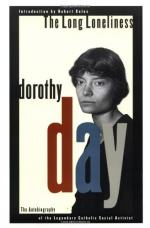|
This section contains 809 words (approx. 3 pages at 400 words per page) |

|
Perspective
Dorothy Day was an early twentieth century traditional Catholic. She was also deeply attracted to radical social activism. Her religious leanings began in early childhood and her discussion of religion and Catholicism in particular pervade the book. She also indirectly makes arguments for her faith, such as discussing the value of liturgy, the attractiveness of a supernaturalist approach to human suffering and vice, and a strong theological foundation for loving the poor and avoiding excessive materialism. She is never anti-Protestant, but speaks as if it is clear that the Roman Catholic Church is the one true church.
As a young woman, Day was deeply attracted to radical socialist doctrines; she not only wanted to aid the poor and improve their lives, but to fight against the unjust social conditions that made them poor in the first place. Thus, she advocated picketing on behalf of legal reforms for the...
|
This section contains 809 words (approx. 3 pages at 400 words per page) |

|




